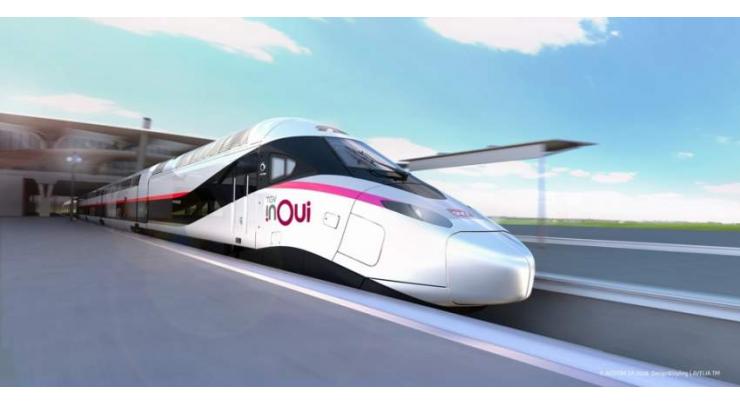
Fast Forward: France Fetes 40 Years Of TGV Trains
Mohammad Ali (@ChaudhryMAli88) Published September 17, 2021 | 04:59 PM

France on Friday celebrated four decades of flying across the countryside on ultrafast TGV trains, while getting a glimpse of the next-generation locomotives set to hit the rails in 2024
Paris, Sept 17 (APP - UrduPoint / Pakistan Point News - 17th Sep, 2021 ) :France on Friday celebrated four decades of flying across the countryside on ultrafast TGV trains, while getting a glimpse of the next-generation locomotives set to hit the rails in 2024.
President Emmanuel Macron was on hand at the Gare de Lyon in Paris, where the first voyage of a Train a Grande Vitesse was inaugurated by president Francois Mitterrand in 1981.
In front of a full-scale model of the new TGV M, he hailed a prime example of "French genius" and promised to unlock 6.5 billion Euros ($7.7 billion) to develop the TGV network, including new lines serving cities such as Nice and Toulouse.
"We're going to continue this grand adventure with new industrial commitments," since more people are looking beyond metropoles to smaller cities -- an apparent allusion to post-Covid prospects.
"We see clearly that life and work are going to be restructured, and that our fellow citizens today want to organise their time for living and time for working differently," he said.
The streamlined version of the bullet train promises to carry more passengers -- up to 740 passengers from 600 -- while using 20 percent less electricity.
It will continue to whiz people between cities at a top speed of 320 km/h (200 mph), making most door-to-door trips shorter and cheaper than on airplanes.
A revered symbol of the country's engineering prowess, the TGV network spreading out from Paris was a revolution for generations of French, with far-flung cities now just a few hours away instead of requiring a day or overnight trip.
The trains, made by Alstom, have since been exported to countries including Spain, Italy, South Korea and the United States.
But huge investments in both the trains and tracks saddled the state rail operator SNCF with billions of euros in debt that continues to weigh decades later.
Critics say an infatuation with high-speed rail also led to broad neglect of regional lines that had kept countless smaller towns and villages alive, accelerating the country's "desertification."The legacy debt prompted Macron to take on the SNCF's powerful unions in 2018 to push through an overhaul that stripped employees of job-for-life and pension guarantees, while promising to revive slower lines.
Labour bosses called it the first step toward privatisation and staged massive transport strikes but failed to derail the reform.
Related Topics
Recent Stories

Senate continues discussion on Presidential address to Joint Sitting of Parliame ..

Masood Khan calls for Pak-US cooperation for regional peace

Interior Minister starts Margalla Trail Patrol for security

Currency Rate In Pakistan - Dollar, Euro, Pound, Riyal Rates On 26 April 2024

Today Gold Rate in Pakistan 26 April 2024

ICC Womens T20 World Cup Qualifier, Match 2: Ireland Women open with Comfortable ..

Robinson, bowlers help New Zealand go 2-1 up against Pakistan

Shahzeb Chachar to hold khuli kachehri on April 26

Heatwave amid Israel's aggression in Gaza brings new misery, disease risk

Tourism must change, mayor says as Venice launches entry fee

Court adjourns Judicial Complex attack case till May 17

Nasreen Noori’s book ‘Popatan Jahra Khwab’ launched
More Stories From World
-
Singapore expects 1-3 pct growth this year
9 minutes ago -
Hong Kong's Hang Seng Tech Index rises over 5 pct
9 minutes ago -
New Zealand business sector R&D expenditure hits 2.21 bln USD
9 minutes ago -
3 dead after mini car falls into west Japan paddy field
9 minutes ago -
Chinese shares higher at midday Friday
9 minutes ago -
Myanmar plans to export 2,000 tons of coffee in 2024-25 fiscal year
19 minutes ago
-
Chinese shares close higher Friday
19 minutes ago -
Pro-Palestinian US campus protests grow as police crack down
39 minutes ago -
Miner Anglo American rejects BHP's $38.8 bn takeover bid
49 minutes ago -
Guatemala prosecutors raid international NGO over alleged child abuse
59 minutes ago -
Another State Dept official resigns over US' Gaza policy amid growing student protests
59 minutes ago -
Togo leader Gnassingbe follows father's political playbook
1 hour ago